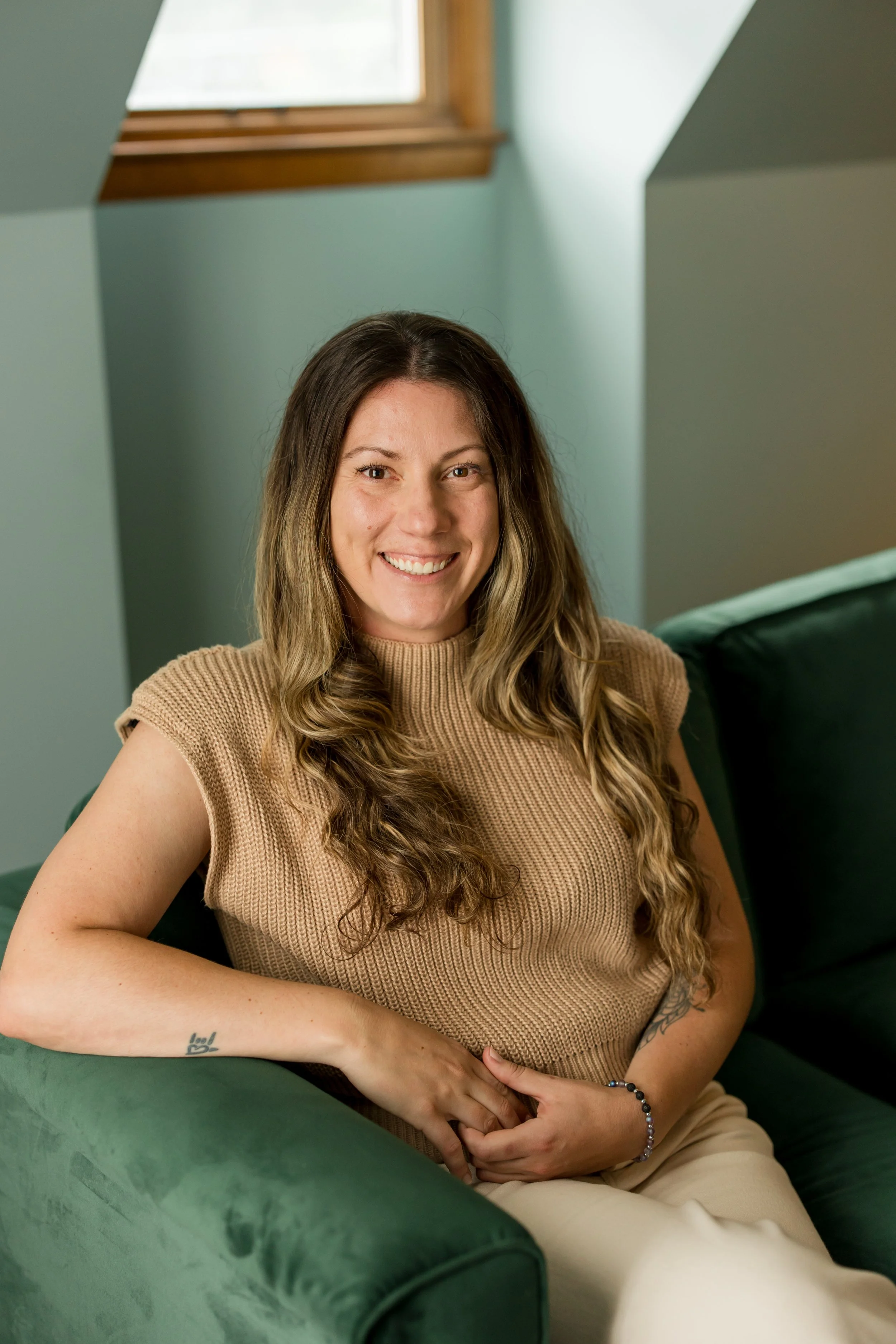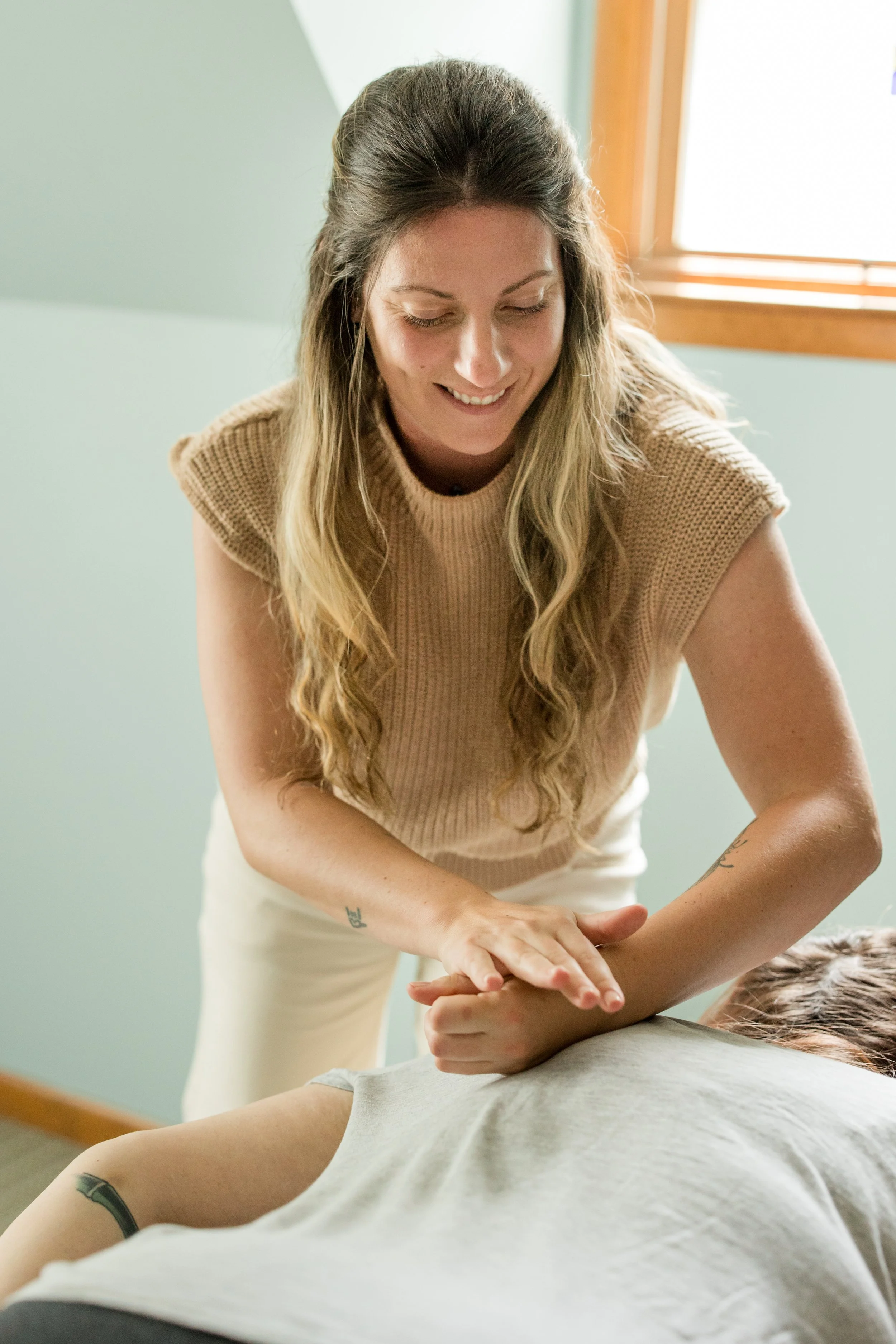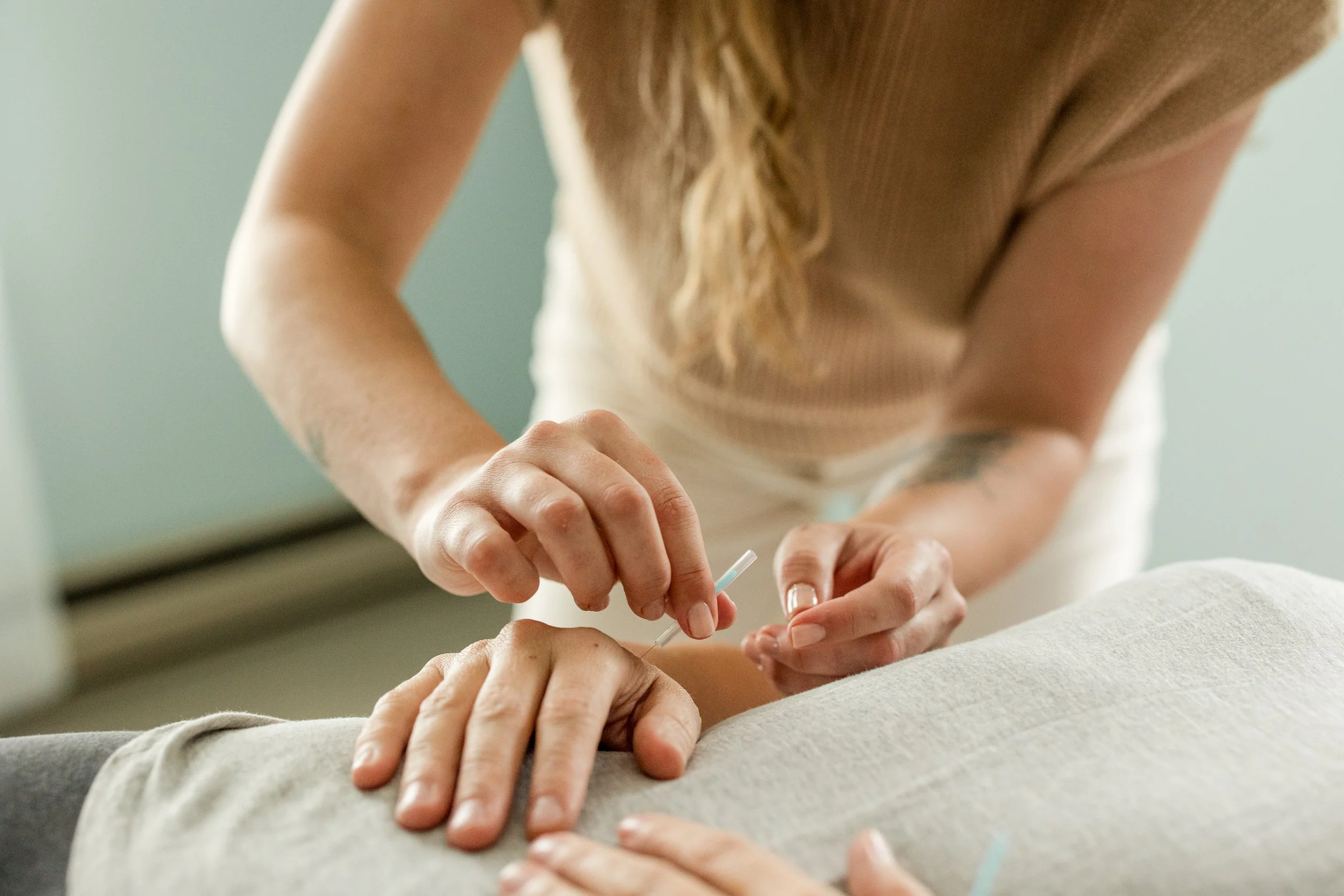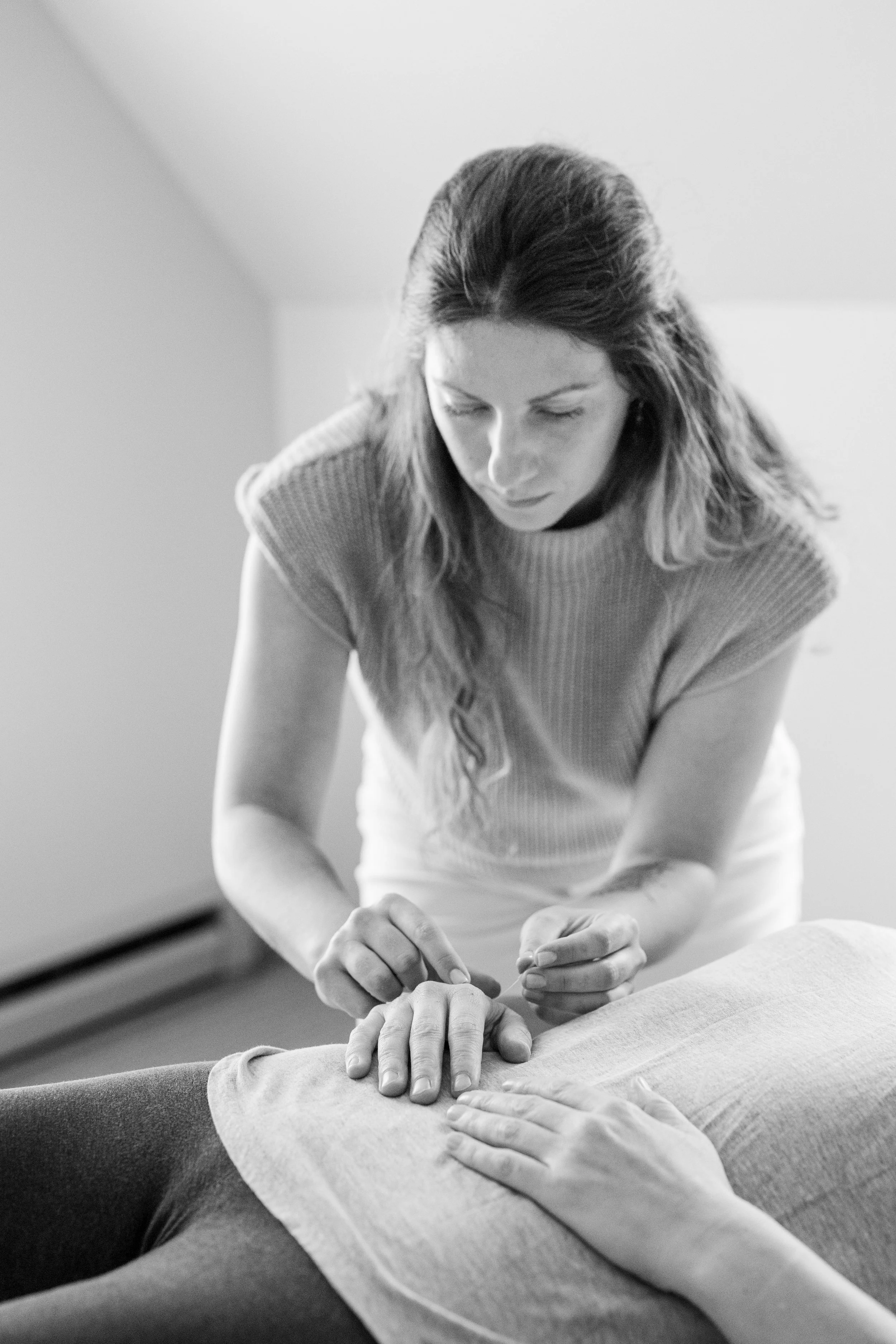Our Providers
Our Providers
Meet Beth
Hello! I’m glad you are here.
I’m Beth, a licensed acupuncturist with a passion for supporting you on your journey towards balance and wellness through the ancient art of Chinese Medicine. I grew up in Pittsburgh, PA and completed my undergraduate in Health Management. After college, I moved to NC where I was introduced to acupuncture after developing an autoimmune condition. I felt discouraged by the limited treatment options that I was presented with, and it was at this time that I tried acupuncture and discovered its healing power. My positive experience as a patient prompted me to shift careers and begin my focus in Chinese Medicine . I completed the 4 years of training at Jung Tao School of Classical Chinese Medicine, graduating in 2024 with a masters level diploma in Acupuncture.
I am fortunate to join Blue Ridge EXA, a local integrative care practice where my services will complement mental health, massage and bodywork therapy offerings. I am committed to complementary medicine coming alongside an individual or loved one's medical support team. Working with an acupuncturist as an integrated part of your overall wellness routine enables your body and mind to find balance, reset your nervous system, and creates space for you to be more present and experience life with less resistance. My approach emphasizes the ability of acupuncture to partner with one's body and guide it back to its inherent ability to heal.
With a deep respect for the wisdom of Chinese Medicine, a trauma-informed heart-centered approach, I provide personalized acupuncture treatments that address not only physical symptoms but emotional and energetic imbalances. My goal is not just to relieve symptoms, but to help you feel more at home in your body, more connected to your emotions, and more empowered in your healing journey.
Learn about my services
-
Acupuncture is a Classical Chinese Medicine practice that involves inserting thin needles into specific points on the body to promote healing and balance. When Qi is blocked, weak, or imbalanced, it can lead to physical or emotional illness. Acupuncture aims to restore the smooth flow of Qi and support the body’s natural ability to heal. It's often used to relieve pain, and studies suggest it can be effective to manage stress, anxiety, depression, insomnia, fatigue, migraines, digestive issues, and hormonal imbalance.
-
Electroacupuncture is a therapeutic technique that blends classical acupuncture with modern electrical stimulation. This offering stands at the forefront of innovative therapeutic approaches within alternative medicine. A device sends gentle electrical currents through acupuncture needles that are strategically placed on the body. The frequency and intensity of the current are carefully adjusted based on your needs- it should feel like a mild buzzing sensation, never painful.
This added stimulation enhances the therapeutic effects of traditional acupuncture by further modulating nerve activity, promoting blood circulation, reducing inflammation, and triggering the release of natural pain-relieving chemicals in the body. This technique can be used to treat various conditions, including chronic pain, neuropathy, nerve or soft tissue damage and repair, muscle spasms and tension, and even fertility support. -
Cupping therapy is an ancient healing method that involves placing cups on the skin to create suction. This suction helps stimulate blood flow, release muscle knots and tension, reduce pain, aid in detoxification, and promote relaxation and healing. Cupping is often used for back pain, neck tension, sore muscles, migraines, respiratory issues, sports recovery, and for general relaxation.
-
Gua sha is a traditional Chinese medicine practice involving scraping the skin with a smooth-edged tool to promote blood flow, release tension, and promote healing. The tool is used to stroke the skin in one direction after applying oil. Gua sha is commonly used for muscle and joint pain, tension headaches, chest congestion, and stress and anxiety. Gua sha usually feels deeply relieving- like a strong massage, and you may feel lighter, clearer, and emotionally unblocked after treatment.
Acupuncture Focus Areas
-
Acupuncture supports women’s health by regulating hormonal balance, improving circulation, easing emotional stress, and promoting the body’s natural healing systems. It treats a wide range of conditions across all stages of life- from menstruation to menopause and beyond.
Menstrual Health
Regulates irregular or absent periods
Eases PMS, cramps, and heavy bleeding
Balances estrogen and progesterone levels
Fertility & Reproductive Support
Enhances fertility (natural or alongside IVF/IUI)
Improves uterine lining and ovarian function
Regulates ovulation
Supports early pregnancy and reduces miscarriage risk
Pregnancy & Postpartum Care
Reduces nausea, fatigue, and back pain
Prepares the body for labor (including breech baby positioning)
Aids in recovery after birth (energy, lactation, hormone balance)
Menopause & Perimenopause
Alleviates hot flashes, night sweats, mood swings
Supports sleep, memory, and emotional balance
Helps with vaginal dryness and libido
Other Women’s Health Concerns
Endometriosis
Polycystic Ovary Syndrome (PCOS)
Fibroids
Urinary tract health
Breast tenderness or hormonal acne
-
Acupuncture helps with stress relief by calming the nervous system, balancing hormones, and improving the flow of energy throughout the body. It addresses both the physical symptoms and emotional effects of stress, helping you feel more grounded, clear, and resilient.
Regulates the Nervous System
Activates the parasympathetic nervous system (rest-and-digest mode)
Reduces overactivation of the sympathetic nervous system (fight-or-flight response)
Creates a sense of calm and ease, often within minutes of treatment
Balances Hormones & Neurotransmitters
Lowers cortisol (the stress hormone)
Increases endorphins, serotonin, and dopamine (the feel good hormones)
Stabilizes mood and reduces anxiety-related symptoms
Eases Physical Symptoms of Stress
Reduces muscle tension, especially in the neck, shoulders, and jaw
Improves digestion, often disrupted by chronic stress
Helps with headaches, insomnia, and fatigue
-
Acupuncture helps with chronic pain by reducing inflammation, improving blood flow, releasing natural pain-relieving chemicals, and calming the nervous system. It is widely used to treat a range of chronic pain conditions with minimal side effects.
Improves Circulation and Reduces Inflammation
Stimulates microcirculation in painful or stiff areas
Reduces local inflammation and swelling
Encourages the body’s healing response
Releases Endorphins and Natural Painkillers
Increases production of endorphins, enkephalins, and dynorphins (your body’s natural opioids)
Decreases pain sensitivity and improves mood
Resets the Nervous System
Calms overactive pain signals from the brain and spinal cord
Reduces “central sensitization” (when the body becomes hypersensitive to pain)
Promotes relaxation and better sleep, which supports recovery
Releases Muscle Tension
Loosens tight muscles and fascia
Balances organ systems that contribute to chronic pain
Supports the whole-body healing process
-
Item description
-
Acupuncture supports emotional health by regulating the nervous system, balancing hormones, and harmonizing energy (Qi) flow through the body. In Chinese Medicine, emotions are closely tied to organ systems, and acupuncture helps restore equilibrium between the mind and body.
Regulates the Nervous System
Activates the parasympathetic (rest-and-digest) response
Calms the sympathetic (fight-or-flight) response
Reduces anxiety, panic, and physical tension
Promotes better sleep and mental clarity
Balances Neurotransmitters and Hormones
Increases natural production of serotonin, dopamine, and endorphins (feel good hormones)
Supports mood stabilization and reduces mood swings
Helps regulate cortisol (stress hormone)
Processing Emotional Blockages
In Traditional Chinese Medicine, acupuncture targets specific points to release stuck energy and promote emotional flow. Emotions like anger, grief, worry, fear, and joy are each associated with different organs.
Liver: Anger, frustration, stuck emotions
Lung: Grief, sadness, letting go
Heart: Joy, anxiety, overexcitement
Spleen: Worry, overthinking
Kidney: Fear, insecurity
Emotional Shifts May Include:
Feeling lighter or clearer
Emotional release during or after treatment
Deeper sense of inner peace and self-connection
-
Acupuncture helps with addiction recovery by calming the nervous system, reducing cravings, supporting emotional regulation, and restoring energetic balance. It's often used as a complementary therapy alongside counseling, detox programs, or medication-assisted treatment.
Reduces Cravings & Withdrawal Symptoms
Diminishes the intensity of physical cravings (especially for nicotine, opioids, alcohol, or stimulants)
Helps ease withdrawal symptoms such as:
Nausea
Muscle aches
Sweating
Irritability
Insomnia
Regulates the Nervous System
Calms the fight-or-flight stress response
Promotes relaxation
Helps rebalance neurotransmitters like dopamine and serotonin
Supports Emotional Healing
Helps process grief, shame, trauma, and anxiety that may underlie addictive behavior
Stabilizes mood and reduces emotional reactivity
Supports mental clarity and decision-making
Builds Inner Resilience
Enhances willpower and a sense of groundedness
Encourages self-awareness and body-mind connection
Promotes better sleep and digestion
Auricular Acupuncture (NADA Protocol)
A well-known treatment in addiction settings is the NADA protocol (National Acupuncture Detoxification Association), which uses 5 points in the ear to:
Calm the mind
Reduce cravings
Support detox
Improve sleep
Reduce agitation or emotional overwhelm
-
Coming Soon!
FAQs
-
I offer a free 15 minute consultation prior to all bookings. Consultations and treatments are booked via email: bethowocacu@gmail.com
-
No, treatments are by appointment only.
-
New Patient Acupuncture treatment (90 minutes): $125
Follow-up Acupuncture treatment (60 minutes): $75
Package deal that includes 4 treatments (1 new patient + 3 f/u): $300
20% off for teachers, retired teachers, active military, veterans, and first responders
Please inquire for sliding scale options based on annual income.
I utilize a HIPPA compliant online program to access all of the introductory paperwork and store payment information. I believe this is helpful so that we may spend all of our time during treatments focusing on your goals.
-
No, I am not in network with any insurance companies. I accept cash, check, or card for payment. Upon request I can provide you with a superbill that you can submit to your insurance company for possible reimbursement.
-
During your initial appointment, we will meet and go over your full health history and talk about any concerns. I will ask questions regarding your health, symptoms, and lifestyle. I will check your pulses and also take a look at your tongue for diagnostic purposes. Gathering this information helps me create an effective treatment plan that is tailored to you.
After the intake, I will administer the acupuncture treatment and insert thin, sterile needles into specific points on your body. If necessary, I may also use other modalities such as tui na massage, electrostimulation, cupping, or gua sha. After the needle insertion, I will step out of the room and let you rest and relax with the needles still inserted for about 20 minutes. As you rest, the needles will continue to work to restore balance and homeostasis in your body.
After the session, you may feel relaxed, energized, or experience a release of tension or emotions. It is recommended that you take it easy (REST!) after your treatment, stay hydrated, and refrain from strenuous activities. Acupuncture treatments often involve multiple sessions over time, and I will provide you with recommendations and a future treatment plan.
-
I recommend wearing loose-fitting, comfortable clothing to your acupuncture treatment. It is best to avoid anything that is too tight or restricting. Some areas that will need to be easily accessed are lower legs from the knees down, elbows to wrist, neck, shoulders, and abdomen. If access is needed to a part of your body that is covered by your clothing, I may ask you to undress to your comfort level and a drape or robe will be provided. I want you to be comfortable during your session!
-
Yes! Acupuncture is considered safe when performed by a trained and licensed acupuncturist. I am licensed in NC and certified with Clean Needle Technique (CNT). I only use sterile, single-use needles, which are disposed of in a medical sharps container after each treatment. Acupuncture is one of the safest holistic treatments available- it is non-invasive, drug-free, and often deeply relaxing.
-
Acupuncture can treat a wide variety of conditions, both physical and emotional. Here is an overview of some of the common conditions that acupuncture can help with:
Pain Relief: Back pain, neck pain, joint pain, sciatica, headaches, migraines, arthritis, sports injuries, TMJ, muscle tension, fibromyalgia, plantar fasciitis, post-op recovery
Mental & Emotional Health: Stress, anxiety, panic attacks, depression, PTSD, trauma support, insomnia, emotional regulation, grief, mood swings, addictions, heartbreak
Digestive Disorders: Diarrhea, constipation, irritable bowel syndrome (IBS), acid reflux, GERD, abdominal bloating, nausea, inflammatory bowel disease (IBD)
Women’s Health: PMS, menstrual irregularities, menstrual cramps, fertility and reproductive health, pregnancy and postpartum care, menopausal symptoms, endometriosis, fibroids, incontinence, frequent urination
Respiratory Conditions: Asthma, allergies, chronic cough, bronchitis, sinusitis, immune system support (for colds, flu, long covid)
Neurological Disorders: Neuropathy, post-stroke recovery, Bell’s palsy, trigeminal neuralgia, vertigo, tremors, shingles
Other: Autoimmune disorders, chronic fatigue syndrome, hormonal imbalances, skin conditions, men’s health, tinnitus and hearing issues, cardiovascular disorders, chemotherapy/radiation side effects
-
Great question! Most people find that acupuncture doesn’t hurt; however, the experience can vary depending on the person’s sensitivity, the condition being treated, and the practitioner’s technique.
Acupuncture needles are extremely thin- about the width of a human hair.
You might feel:
-Nothing/Minimal sensation
-A tiny prick or tap as the needle goes in
-A dull ache, tingling, or warm sensation once the needle is in place (this is a good sign)
-
Acupuncture is considered a safe and well-tolerated therapy when performed by a trained and licensed practitioner. However, as with any medical treatment, there can be side effects- most are mild and temporary.
Soreness: Mild tenderness or itchiness at the needle insertion site, especially if it's your first time.
Bruising: A small bruise or drop of blood may appear at the needling site.
Fatigue: Some people feel tired or deeply relaxed after a session; this is often part of the body's healing response.
Dizziness or Lightheadedness: This may occur if you've not eaten beforehand or if you're particularly sensitive or anxious. I recommend eating a small meal or snack prior to treatment.
Emotional Release: Acupuncture can trigger an unexpected emotional reaction (crying, laughter, etc.), especially if releasing stored tension or grief. -
The effects of acupuncture can vary from person to person. Some people feel results immediately, while others may need a few weeks or months of consistent treatment. Healing with acupuncture builds over time and depends on how long you’ve had the condition, your overall health and lifestyle, and how consistent you are with treatment and other therapies.
Acute conditions or mild symptoms- Such as acute injury or mild headache- may improve after 1 or 2 treatments.
For many common concerns/moderate symptoms- Such as joint pain, menstrual regulation, mild to moderate depression or anxiety, digestive conditions, fatigue- may improve after 3-6 treatments
Chronic or complex conditions- Autoimmune disorders, long-term emotional processing or trauma, hormonal imbalances, neurological issues- may require longer term support, 6 or more treatments
Cancellation policy
Please allow 24-hour notification if you are not able to make your appointment, if no notice is given, you will be charged for the full session.
Contact Beth
Contact Beth
HERE ARE MORE WAYS we can work together
Massage
Traditional Thai Yoga Massage is a holistic, meditative, and interactive style of bodywork.
Workshops
Our workshops are a space where you can explore, express, connect, and transform. Guided by experienced and compassionate providers.
Contact
We would love to connect with you. Please fill out our contact form and we will be in touch as soon as possible.



